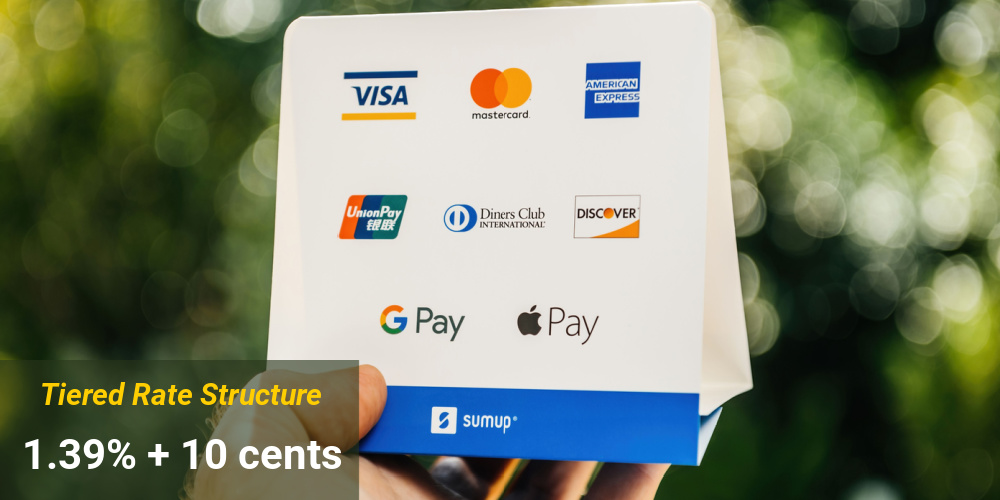Are you looking to start your own business in the payment processing industry? Becoming a merchant service provider can be a lucrative venture, especially in today's digital age where cashless transactions are becoming increasingly popular. By offering credit card processing services to businesses, you can help them streamline their operations and increase their sales. In this guide, we will walk you through the steps to become a merchant service provider using white label payment processing.
What is a Merchant Service Provider?
A Merchant Service Provider (MSP) is a company that provides businesses with the tools and services they need to accept credit card payments from customers. This includes setting up merchant accounts, processing transactions, and providing customer support. MSPs work with banks and credit card networks to facilitate the payment process and ensure that funds are securely transferred from the customer's account to the business owner's account.
Why Become a Merchant Service Provider?
Becoming a merchant service provider can be a profitable business opportunity for several reasons:
1. High demand: With the rise of e-commerce and mobile payments, more businesses are looking for reliable and affordable payment processing solutions.
2. Recurring revenue: MSPs typically charge a percentage of each transaction as well as a monthly fee, providing a steady stream of income.
3. Value-added services: In addition to credit card processing, MSPs can offer additional services such as fraud protection and chargeback management, adding further value to their clients.
4. Flexibility: As a merchant service provider, you can work with businesses of all sizes and industries, giving you the opportunity to build a diverse portfolio of clients.
How to Become a Merchant Service Provider?
To become a merchant service provider, you will need to follow these steps:
1. Research the Industry: Before you start your business, it's essential to understand the payment processing industry, including key players, trends, and regulations. You can attend trade shows, read industry publications, and network with other professionals to gain insights into the market.
2. Choose a Business Model: There are several ways to become a payment service provider, including becoming an Independent Sales Organization (ISO), joining an ISO program, or partnering with a white label payment processor. Each option has its own pros and cons, so it's important to choose the model that aligns with your goals and resources.
3. Obtain Necessary Licenses and Certifications: Depending on your location, you may need to obtain certain licenses and certifications to operate as a merchant service provider. This can include a Payment Card Industry Data Security Standard (PCI DSS) certification, as well as state and federal licenses.
4. Partner with a White Label Payment Processor: White label payment processing allows you to offer credit card processing services under your brand without having to build your own infrastructure. By partnering with a white label payment processor, you can focus on selling merchant services and leave the technical details to the experts.
5. Develop a Sales and Marketing Strategy: To attract clients and grow your business, you will need a robust sales and marketing strategy. This can include creating a professional website, attending networking events, and offering promotional deals to new clients.
6. Provide Excellent Customer Service: As a merchant service provider, you will be responsible for handling customer inquiries, resolving issues, and ensuring that transactions are processed smoothly. By providing excellent customer service, you can build trust with your clients and retain their business over the long term.
7. Stay Updated on Industry Trends: The payment processing industry is constantly evolving, with new technologies and regulations emerging all the time. To stay competitive, it's important to stay updated on industry trends and adapt your business accordingly.
White Label Payment Processing: A Cost-Effective Solution
White label payment processing is an attractive option for entrepreneurs looking to start a credit card processing business without the high upfront costs and technical challenges of building their own infrastructure. With white label payment processing, you can leverage the expertise and resources of an established payment processor, while branding the services as your own.
Benefits of White Label Payment Processing:
1. Quick Setup: With white label payment processing, you can start offering credit card processing services to businesses in a matter of days, rather than weeks or months it would take to build your own infrastructure.
2. Cost-Effective: White label payment processing is a cost-effective solution for small businesses and startups, as you only pay for the services you use, rather than investing in expensive hardware and software.
3. Scalable: As your business grows, you can easily scale your white label payment processing services to accommodate more clients and transactions, without having to worry about capacity constraints.
4. Branding Opportunities: By white labeling the payment processing services, you can promote your brand and build brand recognition among your clients, without having to invest in marketing and advertising.
5. Technical Support: With white label payment processing, you have access to technical support and expertise from the payment processor, ensuring that your clients' transactions are processed securely and efficiently.
Best White Label Payment Processors:
When choosing a white label payment processor, it's important to consider factors such as pricing, reliability, customer support, and security. Here are some of the top white label payment processors in the industry:
1. Stripe: Stripe is a popular white label payment processing solution that offers a range of payment options, including credit card processing, e-checks, and digital wallets. With competitive pricing and advanced security features, Stripe is a great option for businesses of all sizes.
2. Square: Square is another well-known white label payment processor that specializes in providing payment solutions for small businesses. With user-friendly interfaces, affordable pricing, and excellent customer support, Square is a top choice for startups and entrepreneurs.
3. PayPal: PayPal is a trusted white label payment processor that offers a wide range of payment options, including credit card processing, PayPal payments, and PayPal Credit. With a strong reputation for security and reliability, PayPal is a popular choice for businesses of all sizes.
4. Authorize.Net: Authorize.Net is a white label payment processor that specializes in providing payment gateway services for e-commerce businesses. With robust fraud protection features, easy integration, and competitive pricing, Authorize.Net is a top choice for online retailers.
5. Fattmerchant: Fattmerchant is a white label payment processor that offers transparent pricing and personalized service to its clients. With a focus on customer satisfaction and innovative technology, Fattmerchant is a great option for businesses looking for a reliable payment processing partner.
In conclusion, becoming a merchant service provider using white label payment processing can be a rewarding and profitable venture. By partnering with a white label payment processor, you can offer credit card processing services to businesses under your own brand, without the high upfront costs and technical challenges of building your own infrastructure. With the right strategy and dedication, you can build a successful credit card processing business and help businesses streamline their operations and increase their sales.
Unleashing Your Sales Potential: Mastering Credit Card Processing for 6-Figure Earnings
Are you ready to unlock your sales potential and skyrocket your earnings? If you're in the business of selling products or services, mastering credit card processing could be the key to achieving six-figure earnings. In today's digital age, accepting credit cards has become a fundamental aspect of running a successful business. But simply having a credit card reader isn't enough. To truly maximize your profits, you need to understand the intricacies of credit card processing and harness its power to your advantage. In this blog post, we'll delve into the world of credit card processing, providing you with invaluable insights and strategies to help you take your sales game to the next level. Get ready to unleash your sales potential and achieve the financial success you've always dreamed of.
Introduction to Credit Card Processing Agents
Becoming a credit card processing agent requires a deep understanding of the intricate transfer of payments between merchants and cardholders during credit or debit card transactions. As an individual in this role, you hold the key to facilitating smooth and secure payment transfers. One crucial aspect to consider is the availability of white label payment solutions, which can significantly enhance your services. By offering these innovative solutions, you can provide merchants with a seamless and customizable payment experience, tailored to their specific needs. The confidence and expertise you bring to your role as a credit card processing agent can make all the difference in ensuring a seamless and efficient payment process for merchants and cardholders alike.
Becoming a credit card processing agent is an exciting opportunity that requires a confident and proactive approach. As a processing agent, your main responsibility lies in ensuring that transactions go through seamlessly, providing security for both the merchant and the customer to safeguard against any unauthorized activity. Additionally, you will have a crucial role in selling credit card machines, equipping businesses with the tools they need to accept payments efficiently and effectively. This requires a high level of confidence as you educate merchants about the benefits of these machines and convince them of their necessity. By leveraging your knowledge and expertise in the field, you can help businesses thrive by providing a reliable and secure payment solution while simultaneously generating sales for credit card machines.
Becoming a credit card processing agent is an esteemed profession that requires a certain level of expertise and credibility. To embark on this career path, one must first obtain certification from a reputable organization. This certification serves as a gateway, providing access to essential software, network connections, and other indispensable tools pivotal for the successful processing of payments. By acquiring this certification, individuals can confidently navigate the intricate world of credit card processing, armed with the necessary qualifications and resources to excel in this ever-evolving field.
Next, in order to excel in the role of a credit card processing agent and reap substantial success, an in-depth understanding of merchant services and payment processing technologies is imperative. Being knowledgeable about these crucial aspects allows you to effectively educate potential clients on the advantages of utilizing your services. By possessing expertise in selling payment processing services, you can confidently address the concerns and queries of merchants, instilling a sense of trust and assurance in your abilities. With this comprehensive skill set, you will be well-equipped to navigate the highly competitive and ever-evolving world of credit card processing, ultimately establishing yourself as a trusted and sought-after agent in the industry.
Understanding the Basics of Credit Card Processing Terminology
In order to become a successful credit card processing agent and effectively sell merchant services, it is crucial to have a strong understanding of the basics of credit card processing terminology. Key terms that you must familiarize yourself with include interchange and acquirer. Interchange refers to the fee that merchants pay for the privilege of accepting credit cards, while an acquirer represents the bank or other financial institution responsible for processing card payments on behalf of these merchants. By grasping the significance of these terms, you can confidently navigate the intricacies of the credit card processing industry and provide valuable guidance to merchants seeking to optimize their payment systems.
In order to become a successful credit card processing agent, it is crucial to have a comprehensive understanding of various key concepts. Familiarizing yourself with authorization, settlement, and batching will further enhance your knowledge and confidence in this field. Authorization plays a pivotal role as it involves the payment processor seeking approval from a payment network to process a transaction. As a merchant sales representative, it is important to know how this process works in order to facilitate smooth transactions for your clients. On the other hand, settlement refers to the crucial moment when funds are transferred from the customer's account to the merchant's account following a successful payment. Understanding the intricacies of settlement enables you to ensure that your clients receive their funds promptly and accurately. Additionally, becoming acquainted with batching is essential as it allows transactions to be grouped within a certain period of time, simplifying data tracking. This knowledge will assist you in efficiently managing your clients' transactions and providing them with reliable support. By confidently familiarizing yourself with these vital aspects of credit card processing, you will be well-equipped to excel as a credit card processing agent and provide exceptional service to your clients.
Furthermore, as you strive to become a credit card processing agent and excel in merchant account sales jobs, it is crucial to comprehend additional terms such as chargeback fees andnon qualified rates. Understanding chargeback fees is essential, as they pertain to penalties imposed by banks for fraudulent transactions. By being well-informative about this aspect, you can provide valuable insights to potential clients and help them mitigate risks associated with fraudulent activities. Moreover, it is equally important to grasp the concept ofnon qualified rates, which involve higher fees that may be applied in certain instances, such as international transactions or specific methods of acceptance. By familiarizing yourself with these terms and their implications, you can confidently navigate the complexities of credit card processing and offer informed solutions that best serve the needs of your clients.
Analyzing Your Market and Identifying Potential Customers
When aspiring to become a credit card processing agent, it is essential to have a comprehensive understanding of your market. A crucial step in this process is researching existing credit card processing agents in your area to gain insights into the competitive landscape. By analyzing the different players in the market, you can gather valuable information that will help you develop effective strategies and stand out as a merchant sales representative. This research will empower you to identify the strengths and weaknesses of your competitors, allowing you to leverage your own unique selling points and offer superior services to potential clients. Embracing this confident approach will undoubtedly pave the way for success in the highly competitive world of credit card processing.
To become a credit card processing agent, one of the initial steps is to generate a comprehensive list of potential customers for your services. This can be accomplished by considering various factors such as the size of the businesses, their industry, annual revenue, and their desired payment processing solutions. This strategic approach will enable you to target the right audience who are most likely to benefit from your credit card processing services. By evaluating these key factors, you can confidently approach potential clients, knowing that you have thoroughly researched and identified their specific needs and requirements. This proactive and diligent approach will enhance your chances of success as a credit card processing agent.
To become a successful credit card processing agent, one of the key strategies is to actively identify potential customers and thoroughly research their current payment solution providers. By doing so, it becomes easier to uncover opportunities where we can offer cost savings and improved customer service to these businesses. This proactive approach allows us to target our efforts towards clients who are already dissatisfied with their current payment solutions and are actively seeking better options. Armed with this knowledge, we can confidently approach these potential customers, demonstrating how our services not only provide cost savings but also enhance their overall customer experience. By focusing on meeting their specific needs and highlighting the advantages we offer, we position ourselves as trusted experts in the industry, capable of providing tailored solutions and superior service.
Thereafter, it is crucial to consider how much you can make selling merchant services when you become a credit card processing agent. By carefully analyzing your target market and assessing their needs, you can determine the most effective strategies to reach out and market your services to potential customers. Email campaigns, direct mailers, and targeted Google ads are just a few examples of the various methods you can utilize. With a confident tone, seize this opportunity to establish yourself as a successful credit card processing agent and maximize your earning potential in this thriving industry.
Designing an Effective Sales Strategy
When it comes to becoming a credit card processing agent and excelling in merchant account sales jobs, one must begin by crafting an effective sales strategy. This strategy hinges on a thorough understanding of the target customer. By taking the time to identify their specific needs, you can tailor your approach and showcase your product or service in the most compelling way possible. This level of understanding is crucial in order to successfully make the sale and emerge as a top-performing credit card processing agent. With confidence and finesse, you can navigate the competitive landscape of merchant account sales jobs and establish yourself as a formidable force in the industry.
When aiming to become a credit card processing agent, it is crucial to develop the skill of creating customized presentations that effectively showcase the advantages of your product or service in comparison to competitors. The key to success lies in tailoring each presentation to the specific needs and preferences of the customer. By doing so, you can confidently emphasize the benefits of selling credit card machines, such as enhanced efficiency and convenience for businesses. Highlighting how your product surpasses others in terms of features, security measures, and cost-effectiveness will enable you to establish a strong position in the market. Through confident and persuasive presentations, you will be able to establish trust with potential clients and pave the way for successful business partnerships.
To become a successful payment processing agent, it is crucial to utilize relevant marketing tools such as webinars, email campaigns, videos, and social media channels. These powerful resources allow you to connect with potential customers effectively and build strong relationships with them over time. By hosting webinars and sharing valuable insights about credit card processing, you can establish yourself as an expert in the field and gain the trust of your audience. Email campaigns provide a great opportunity to engage with prospects, offering them information about merchant services and addressing their queries. Additionally, videos can be created to showcase the benefits of credit card processing and how it can positively impact businesses. Leveraging social media platforms allows you to reach a wider audience, engage in conversations, and actively participate in relevant communities. By implementing these marketing strategies, you can confidently demonstrate your expertise and commitment to helping others succeed in the industry. Now, when it comes to the query "how much can you make selling merchant services," let me assure you, the potential for earnings is substantial. With a competitive commission structure and the ability to earn residual income on a monthly basis, becoming a credit card processing agent can be highly lucrative. As you establish relationships with merchants and help them with their payment processing needs, your earnings increase accordingly. So, by combining effective marketing techniques and seizing the potential for significant financial gains, you can thrive as a credit card processing agent.
Also, as a credit card processing agent, it is crucial to build systems that enable you to track progress and measure results from your sales efforts. By implementing such systems, you will be able to gather data and make data-driven decisions on the changes or improvements needed for success in selling credit card machines. These systems allow you to identify what strategies are working and what areas need improvement, ultimately leading to increased sales and revenue. With a confident tone, you can approach each decision with the certainty that you are basing it on real-time data, ensuring that you are always making informed choices to drive your success as a credit card processing agent.
Maximizing Your Earnings with Credit Card Processing Fees
To become a successful credit card processing agent and maximize your earnings, it is crucial to have a comprehensive understanding of the various types of processing fees that come with accepting credit card payments. By familiarizing yourself with interchange fees, merchant discount fees, authorization fees, statement fees, and other related charges, you can effectively navigate the industry and provide valuable insights to your clients. Additionally, exploring white label payment solutions can significantly enhance your earning potential. With a confident approach and thorough knowledge of the intricacies involved, you can assist businesses in finding tailored solutions that streamline their payment processes and increase their profitability.
As a credit card processing agent, it is crucial to have a comprehensive understanding of how to calculate the effective rate of each fee. This knowledge is essential to ensure that you are not overpaying in processing costs and maximizing your profits. By negotiating a low transaction fee or capitalizing on volume discounts, you can significantly reduce your expenses and boost overall profitability. Moreover, it is imperative to explore white label payment solutions that can provide you with tailored and customizable options to meet the specific needs of your business. Adopting these solutions will not only streamline your payment processes but also enable you to offer seamless and efficient payment experiences to your customers. By staying informed, confident, and proactive in managing fees and exploring innovative solutions, you can excel as a credit card processing agent and drive success for your clients.
However, as a merchant processing agent, it is not just about how much you can make selling merchant services, but also about staying ahead in the industry. By regularly monitoring any changes in the industry that may impact the processing fees, such as government regulations or innovative technologies, you can ensure that you are charging your clients competitive rates. This proactive approach allows you to offer cost-effective solutions to merchants and position yourself as a knowledgeable and reliable agent. By embracing new opportunities and advancements in credit card processing, you can not only maximize your profits but also stay competitive in the market. Ultimately, staying informed and adapting to the evolving landscape of credit card processing is essential for long-term success as an agent in this industry.
Becoming a credit card processing agent is an incredibly rewarding venture that presents a myriad of opportunities to capitalize on the ever-increasing demand for card payments. In today's digital age, where cash transactions are gradually being phased out, the world of merchant services is expanding at an unprecedented rate. As a merchant services agent, you can position yourself at the forefront of this revolution and reap the rewards. One of the most compelling aspects of this field is the potential to earn substantial income. Many individuals may wonder, "How much can you make selling merchant services?" The answer is, quite a lot. With the right skills, dedication, and a strong network of clients, the earning potential is virtually limitless. By confidently embracing this profession, you have the opportunity to transform your financial situation and thrive in the lucrative industry of credit card processing.
Becoming a merchant services agent and joining the industry as a merchant sales representative not only provides the opportunity for high profits but also allows you to be a part of a rapidly growing sector. As a payment processing agent, you can confidently enjoy the potential for substantial financial gains. Additionally, being involved in this industry enables you to participate in an ever-expanding market that is experiencing tremendous growth. Embracing this career path means you are positioning yourself at the forefront of a thriving field, where success and lucrative opportunities await.
By embarking on the journey to become a credit card processing agent, you open up a world of possibilities for success in the merchant account sales job market. With this exciting career, you not only gain access to innovative technologies and services, but also the opportunity to make managing and processing payments more efficient than ever before. With a confident tone, rest assured that as a merchant processing agent, you will have the necessary tools and resources at your fingertips to excel in this fast-paced industry.
Thus, by becoming a credit card processing agent, you not only gain the opportunity to have a successful career in merchant account sales jobs but also become an integral part of the payment ecosystem. Through building strong relationships with merchants, you can provide them with secure payment solutions that will enhance their business operations and increase their customer satisfaction. As an agent, your expertise and knowledge in the field will enable you to confidently navigate the intricacies of the industry and offer tailored solutions to meet the unique needs of each merchant you serve. By continuously adapting to advancements in technology and staying informed about the ever-evolving payment landscape, you will position yourself as a trusted advisor in the industry. Ultimately, as a credit card processing agent, you can contribute to the growth and success of merchants while building a rewarding and lucrative career.
When aspiring to become a credit card processing sales agent, thoroughly researching and comparing different merchant services providers is crucial. It is imperative to explore various options and evaluate the services offered by multiple providers. Key factors to consider include the credit card processing rate, customer service quality, ease of use, and potential associated fees. It is vital to ensure that the selected provider offers excellent customer support and user-friendly features. Additionally, agents must pay attention to the fees associated with the account, ensuring they align with their business goals. Moreover, a successful credit card processing agent should focus on selling credit card machines as part of their overall strategy to maximize profits and provide valuable services to merchants. By confidently exploring and comparing different providers, agents can make informed decisions that will ultimately contribute to their success in the industry.
Becoming an ISO for merchant services involves a thorough selection process to find the right merchant services providers that align with your needs. Once you have identified a few potential providers, it is crucial to ask for quotes from each one and thoroughly compare their rates and fees. Understanding the terms of the agreement is equally important before making any commitment. Being confident in your approach and taking the time to gather information and compare options will greatly contribute to your success as a credit card processing agent.
When aspiring to become a credit card processing agent, it is vital to thoroughly evaluate potential merchant services providers, taking into account not just their offerings but also their customer service track record. One crucial aspect to consider is the provider's ability to deliver reliable and efficient support when it is most needed. This includes ensuring that they are readily available during peak times or in case any issues arise with your account or transactions. By partnering with a merchant services provider that has a proven track record of exceptional customer service, you can confidently offer white label payment solutions to your clients, knowing that you have a reliable support system behind you.
Additionally, as a merchant sales representative, it is crucial to consider the compatibility of payment gateways and other related services offered by the merchant services provider. This ensures that your credit card processing operations are streamlined and efficient, making transactions seamless for both you and your valued customers. By carefully selecting a provider that meets your specific needs and integrates seamlessly with your business software systems, you can confidently offer reliable and secure credit card processing solutions. Embracing these essential aspects will not only enhance your credibility as a credit card processing agent but will also contribute to the growth and success of your business.
Implementing Effective Risk Management Strategies
In order to become a successful credit card processing agent, it is crucial to implement effective risk management strategies that prioritize the safety of customers' financial information. As a merchant sales representative, one must ensure that the necessary precautions are taken to safeguard sensitive data. This can be achieved by employing various strategies, such as filtering out suspicious transactions, utilizing secure payment gateways, and regularly assessing the security measures in place for customer data. By adopting these measures, credit card processing agents can confidently protect their clients' information, strengthening their reputation and earning the trust of customers.
To become a successful payment processing agent, it is crucial to prioritize maximum security for both your clients and their customers. One effective way to achieve this is by utilizing tokenization technology, which serves to conceal sensitive customer information during transit or storage in a database. By employing this advanced safeguarding technique, the risk of fraudsters gaining access to such data and exploiting it for malicious purposes is greatly diminished. This ensures a more secure environment for all parties involved in the payment process. Additionally, as a payment processing agent, it is important to consider the potential earnings from selling merchant services. While it ultimately depends on various factors such as commission structures and client acquisition efforts, the potential to earn a significant income exists within this industry. With confidence and determination, individuals in this field can explore the substantial financial opportunities that come with successfully selling merchant services.
Next, it is imperative for credit card processing agents to consistently update their knowledge and skills in order to stay ahead of ever-evolving fraudulent methods and techniques. By staying informed about the latest trends in fraud and attending regular trainings, these agents can equip themselves with the necessary tools to effectively combat any fraudulent activity. Moreover, maintaining open lines of communication with customers and addressing their concerns promptly can help build trust and establish long-lasting relationships. In conclusion, becoming a credit card processing agent requires vigilance, adaptability, and a commitment to safeguarding customers' financial well-being. With the right expertise and proactive approach, these agents have the power to protect their customers from fraud and ensure a secure credit card experience.
Growing Your Business and Achieving 6-Figure Success
In order to become a successful payment processing agent and achieve 6-figure success, it is crucial to have a well-defined plan and unwavering focus on growth. A key aspect of this journey is establishing measurable goals that serve as benchmarks for success. By outlining specific objectives and creating a strategic roadmap to attain them, you can effectively stay on track towards your desired level of accomplishment. Selling payment processing services requires a confident and deliberate approach, and with the right mindset, determination, and a clear plan for growth, you can enhance your chances of becoming a highly successful credit card processing agent.
To become a successful credit card processing agent, it is crucial to establish robust partnerships with banks, vendors, and other trusted partners. Building these strong relationships is vital for the growth of your business and paving the way towards achieving six-figure success. Moreover, networking with fellow professionals within the industry offers immense benefits. Not only does it allow you to stay updated on the latest trends but also provides valuable insights into new opportunities for expansion. By staying connected and informed, you can maximize your potential as a merchant processing agent. Now you may be wondering, how much can you make selling merchant services? Well, rest assured, the earning potential in this field is considerable. With solid networking, strategic partnerships, and continuous efforts, you can confidently scale up your business and unlock substantial financial rewards.
To become a successful merchant services agent, it is imperative to invest in effective marketing strategies that will bring in new customers and increase awareness of your services as a merchant sales representative. By utilizing online platforms such as social media, SEO optimization, website design, and email campaigns, you can significantly boost your chances of attracting more clients. These digital tools have proven to be incredibly effective in today's technology-driven world, providing immense opportunities for reaching a wider audience. By implementing a well-crafted marketing plan, you can confidently position yourself as a trusted credit card processing agent, showcasing your expertise and highlighting the value you bring to businesses seeking reliable payment solutions. With the right marketing approach, you can establish a strong presence in the industry, build credibility, and ultimately drive higher sales as a merchant sales representative.
Again, implementing systems to streamline processes, such as automating billing, invoicing, payroll, customer relations management (CRM), and selling credit card machines, will undoubtedly save you valuable time and money while increasing efficiency within your business operations. By embracing these technological advancements, you can focus on what truly matters – growing your business and reaching 6-figure success faster! With the ability to automate various tasks, you can allocate more time towards developing strong relationships with clients and expanding your customer base. In turn, this enhanced efficiency will help your business thrive and position you as a leading credit card processing agent in the industry. Trust in the power of automation and witness the transformative impact it has on your day-to-day operations.
Conclusion
In conclusion, by mastering the art of credit card processing, you hold the key to unlocking a world of possibilities for your business. With the right knowledge and strategies in place, you can tap into the vast potential of credit card transactions and propel your earnings into the realm of six figures. Embracing this indispensable tool of the digital age will not only enhance your customers' experience but also solidify your position as a successful and forward-thinking entrepreneur. So, take charge, delve into the intricacies of credit card processing, and get ready to soar to new heights of financial success. The path to six-figure earnings is within your grasp – all you have to do is unleash your sales potential.
In today's digital age, payment processing has become an essential service for businesses of all sizes. Whether you are a small online retailer or a large corporation, you need to have the ability to accept credit card payments from your customers. This is where Merchant Services ISO Programs come into play. These programs allow individuals or companies to become registered ISOs (Independent Sales Organizations) and offer payment processing services to businesses. In this comprehensive guide, we will discuss what Merchant Services ISO Programs are, how to become a registered ISO, the benefits of white label payment processing for starting a Merchant Services company, how to become a payment processor, and how to sell payment processing services to small businesses.
What is a Merchant Services ISO Program?
A Merchant Services ISO Program is a program offered by payment processing companies that allows individuals or companies to become registered ISOs and offer payment processing services to businesses. ISOs act as intermediaries between merchants and payment processors, helping businesses set up and manage their payment processing systems. By becoming an ISO, you can earn commissions on the transactions processed by the merchants you sign up, making it a lucrative business opportunity.
How to Become a Registered ISO?
Becoming a registered ISO involves several steps, including:
1. Researching the industry: Before you can become a registered ISO, you need to have a thorough understanding of the payment processing industry. Research different payment processing companies, their fees, and services, and identify the ones that align with your business goals.
2. Choosing a payment processing partner: Once you have a good understanding of the industry, you need to choose a payment processing partner to work with. Look for a company that offers competitive rates, excellent customer service, and a wide range of services to meet the needs of your potential clients.
3. Applying for ISO registration: To become a registered ISO, you will need to apply for registration with the payment processing company of your choice. The company will review your application and may require you to undergo a background check or provide additional information about your business.
4. Training and certification: Once you have been approved as a registered ISO, you may need to undergo training and certification to sell payment processing services. This will help you understand the ins and outs of the industry and provide you with the skills and knowledge you need to succeed as an ISO.
Benefits of White Label Payment Processing for Starting a Merchant Services Company
White label payment processing refers to a service where a payment processing company allows you to resell their services under your own brand name. This is a popular option for individuals or companies looking to start a Merchant Services company, as it allows you to offer payment processing services without the need to develop your own technology or infrastructure.
Some benefits of white label payment processing include:
1. Branding: With white label payment processing, you can build your own brand and create a unique identity for your business. This can help you stand out in a competitive market and attract more clients.
2. Revenue opportunities: By reselling payment processing services under your own brand name, you can earn commissions on the transactions processed by your clients. This can provide you with a steady stream of income and help you grow your business over time.
3. Access to technology: White label payment processing allows you to access cutting-edge technology and services without the need to invest in developing your own infrastructure. This can help you provide a high-quality service to your clients and stay ahead of the competition.
How to become a Payment Processor?
Becoming a payment processor involves several steps, including:
1. Obtaining the necessary licenses: To become a payment processor, you will need to obtain the necessary licenses and certifications from regulatory authorities. This may include registering as an ISO or partnering with a registered ISO to offer payment processing services.
2. Setting up a merchant account: To process payments for businesses, you will need to set up a merchant account with a payment processing company. This account will allow you to accept credit card payments from your clients and process transactions on their behalf.
3. Developing a payment processing system: Once you have your merchant account set up, you will need to develop a payment processing system that meets the needs of your clients. This may involve integrating payment gateways, developing fraud detection systems, and ensuring compliance with industry regulations.
4. Marketing and sales: To attract clients and grow your payment processing business, you will need to invest in marketing and sales efforts. This may include building a website, attending industry events, and reaching out to potential clients through email or phone calls.
How to Sell Payment Processing Services to Small Businesses?
Selling payment processing services to small businesses can be a lucrative opportunity, as many small businesses are looking for affordable and reliable payment processing solutions. To sell payment processing services to small businesses, consider the following steps:
1. Identify your target market: Before you start selling payment processing services, identify your target market and understand their needs. Small businesses may have different requirements than larger corporations, so tailor your services to meet their specific needs.
2. Offer competitive rates: Small businesses are often looking for cost-effective payment processing solutions, so make sure to offer competitive rates and transparent pricing. Consider bundling services or offering discounts to attract clients and stand out from the competition.
3. Provide excellent customer service: Small businesses value excellent customer service, so make sure to be responsive to their inquiries and provide support when needed. Building relationships with your clients can help you retain their business and earn referrals in the future.
4. Educate your clients: Many small businesses may not be familiar with payment processing services, so take the time to educate your clients about the benefits of your services and how they can help them grow their business. This can help you build trust and credibility with your clients and increase your sales.
In conclusion, becoming a payment processor and offering payment processing services to businesses can be a rewarding and profitable business opportunity. By following the steps outlined in this guide and focusing on providing excellent service to your clients, you can build a successful payment processing business and help small businesses thrive in today's digital economy.
Have Questions?
Contact Shaw Merchant Group at (855) 200-8080
© Shaw Merchant Group is a registered DBA of EPX, a registered ISO of BMO Harris Bank N.A., Chicago, IL, Fresno First Bank, Fresno, CA, and Citizens Bank N.A., Providence, RI.









